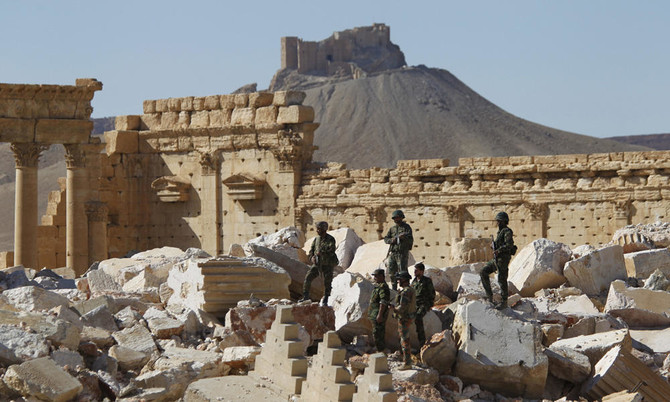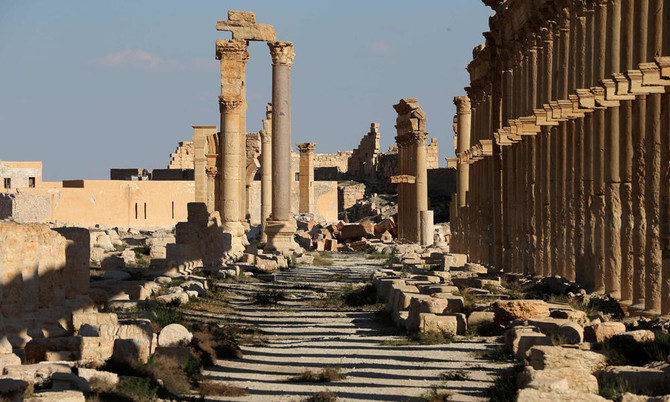BEIRUT, Lebanon: Syrian troops have pushed into Palmyra as they battle to retake the iconic city from the Daesh group, but their advance was slowed Thursday by land mines laid by retreating jihadists.
Bolstered by Russian air strikes and ground troops, Syrian government forces have been battling through the desert for weeks to reach Palmyra.
The oasis city has traded hands several times during the six-year civil war and become a symbol of Daesh’s wanton destruction of cultural heritage in areas under its control.
The jihadist group first seized Palmyra in May 2015 and began to systematically destroy and loot the UNESCO world heritage site’s monuments and temples. Daesh fighters were driven out in March 2016 but recaptured the city last December.
The latest offensive to retake the city saw government forces break through its western limits late Wednesday, forcing Daesh fighters to retreat into eastern districts, according to the Syrian Observatory for Human Rights.
“IS withdrew from most of Palmyra after laying mines across the city. There are still suicide bombers left in the eastern neighborhoods,” Observatory head Rami Abdel Rahman told AFP, referring to the Daesh or Islamic State group.
“Government forces have not yet been able to enter the heart of the city or the eastern parts,” he added.
They have also not yet entered the celebrated ruins that make up the southwestern part of the city.
“There are no IS fighters left in most of the Old City, but it is heavily mined,” Abdel Rahman said.
Before Daesg first entered the city, Palmyra boasted temples, colonnaded alleys and elaborately decorated tombs that were among the best preserved classical monuments in the Middle East.
But many of the monuments have been destroyed and much of the heritage looted for sale on the black market.
Moscow’s support has been key in the Syrian army’s push toward Palmyra, and its warplanes continued to bombard IS positions inside and near the city on Thursday, the Observatory reported.
A decades-old ally of Damascus, Moscow launched an air campaign in September 2015 to help President Bashar Assad’s forces in their fight against what the regime and its allies say are “terrorists.”
Assad counter-offensive
After losing ground in the early years of the war, Assad’s regime has regained significant territory — including by pushing rebel forces out of second city Aleppo last year — thanks in large part to Russian support.
In the north, fighters of the US-backed Syrian Democratic Forces (SDF) announced they would cede several villages to the government as part of a deal brokered by Russia to avoid conflict with Turkey.
Turkey launched a cross-border operation in late August, that it said aimed to counter both Daesh and the SDF, which is dominated by Kurdish fighters that Ankara sees as “terrorists.”
The surprise announcement by the SDF marks the first time that US-supported fighters will cede territory to Assad’s forces.
It said the territory to be handed over lay between Manbij and Al-Bab, which Turkish-backed fighters captured last week from Daesh, to create a buffer zone between them.
Ankara meanwhile renewed its threat to bomb Kurdish fighters unless they withdrew from Manbij, a former bastion of Daesh that is now under SDF control.
“We will strike the YPG if they do not retreat,” Foreign Minister Mevlut Cavusoglu told journalists, referring to the Kurdish People’s Protection Units.
“We do not want our ally the United States to continue cooperating with terror organizations that target us,” he added.
The Turkey-backed rebels launched their advance on Manbij on Wednesday, initially seizing two villages but losing them to the SDF by Thursday.
The profusion of forces operating in Syria has led to a very complicated battlefield and on Wednesday a US general said Russian warplanes had bombed SDF fighters mistakingly believing they were Daesh jihadists.
The Russian defense ministry denied carrying out the air strikes.
Peace talks
This week, Moscow called for “terrorism” to be added to the agenda of UN-sponsored peace talks between opposition and government delegations in Geneva.
The sputtering negotiations so far have focused on three so-called "baskets": governance, the constitution, and elections.
But the main opposition group — after an unprecedented meeting with a Russian minister — said late Wednesday that it would refuse to add terrorism to the areas of discussion.
“We will not deal with it, and if (UN mediator Staffan de Mistura) adds it in any time we will not deal with it or discuss it,” said Yehya Kodmani of the High Negotiations Committee (HNC).
The opposition has accused Assad’s regime of wanting to turn the focus to terrorism as a distraction from political questions.
The Geneva talks, the fourth round of UN-sponsored negotiations in the six-year war, are expected to end before or during the coming weekend, though no formal timeframe has been set.






























